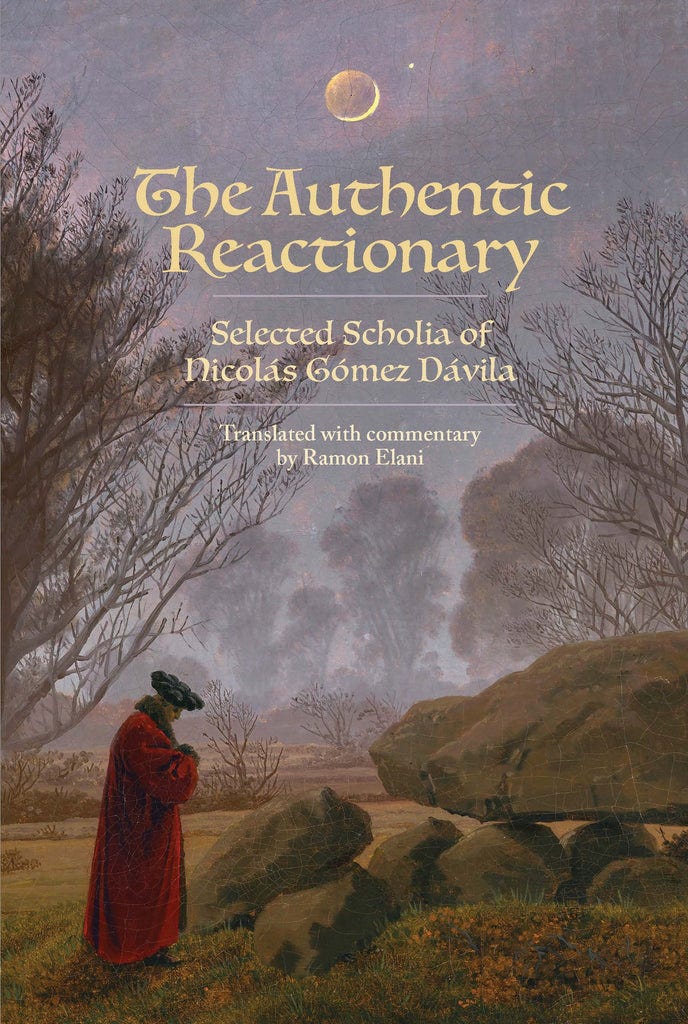Review of “The Authentic Reactionary” by Ramon Elani
How many books does a man need? Answer: not many. It is a great fallacy to think that one may attain wisdom by reading more books. Books, on their own will never provide easy access to wisdom. Wisdom is granted by looking long and hard at one’s self, and the natural world, then, gradually, coming to know the Divine in its multitudinous forms. That being said, there are books that may help one on life’s journey. Those books are the ones that can be read a number of times with benefit. It is better to read a good book a hundred times, rather than a hundred poor or mediocre books once. So, why am I writing a review of The Authentic Reactionary? Because, it is a book that rewards multiple re-readings, and may provide unique benefits to those who are stuck in the quagmire of capitalist modernity.
If you are asking yourself if there is something novel or new in the book, you are already headed down the wrong path. There is nothing new in Elani’s book, and we should thank the Gods for that. We already live in a place and time where the “new” is reified and fetishized. What we need is not more new things, but old things made new. The Authentic Reactionary is structured as headings translated from the scholia of Nicolás Gómez Dávila, followed by a commentary by Ramon Elani. This format is uniquely suited to the current generation of people who have been raised on Twitter, and have no attention span to speak of. The short scholia or aphorisms can function as direct messages or tweets from beyond the grave from Dávila to today’s modern robot masses. Though each aphorism is clear, it may also act like a Zen koan, causing lightening-like illumination in the reader. For this reason, I recommend readers to first go through the entire book, reading only the bolded headings from Dávila. Then on a second, third, and forth reading, the commentaries by Ramon Elani should be included for deep, and thoughtful contemplation. Used this way, I believe the book has something to offer everyone, from the unenlightened woke masses, to the seasoned traditionalist.
Most books published in the last decade are scarcely worth reading—why, after all, should a person read modern drivel, when he or she could spend time with Homer, Dante, Ovid, and the sacred writings of all traditions—but The Authentic Reactionary is most certainly the exception that proves the aforementioned rule. There is scarcely anything I disagree with in the book, and at times I found myself variously laughing out loud, brought close to tears, and reading profound statements to all within hearing distance, as if I was a 19th century socialist rabble-rouser. As with all texts, there are bound to be disagreements. Dávila was a traditional Catholic, and I am an unapologetic universalist pagan. Additionally, Elani, at times—though only at times, largely in the chapter on God and the Gods—comes off as too friendly to certain varieties of Christianity—Chestertonian to be exact—that I find repulsive, but these are only brief moments, and in no way lessen the immense value of the book. During private conversations with the author, these errors have been acknowledged, and a new way forward found through the writings of Ludwig Klages. Someone, somewhere stated that first books and third books are easy, but second books require a long and painful birthing process. Let’s hope that we see more from Mr. Elani in the coming years, hopefully building on his recent studies of Klages. But for right now, this book (the author’s second) has my highest recommendation. Too many recent writings of the traditionalist school have been dogmatic, and lacking in the vitality of the early luminaries, such as Coomaraswamy, Guenon, and Schuon. On the other hand, so many of the “reactionary” works written today are from reprehensible people, with abhorrent views, on the radical right. The Authentic Reactionary doesn’t fall into either of these traps, and is a fresh gust of air in a world that stinks ever more of poison gasses.
Put down your phones and read it!




Thanks for the recommendation. I may give it a read.
I like this: "We already live in a place and time where the 'new' is reified and fetishized. What we need is not more new things, but old things made new. "
There's nothing repulsive in Chestertonian Christianity...
If you take offense to it being against paganism, that's because it's closer to the kind of Christianity that, unlike modern protestant christianity, supercedes paganism and is born from its era and as a reaction to its dead ends.
In that sense that christianity was more paganistic (and more in touch with the original paganism, it's adoptants were literally original pagans) than much of modern paganism (which is modernity in cosplay).